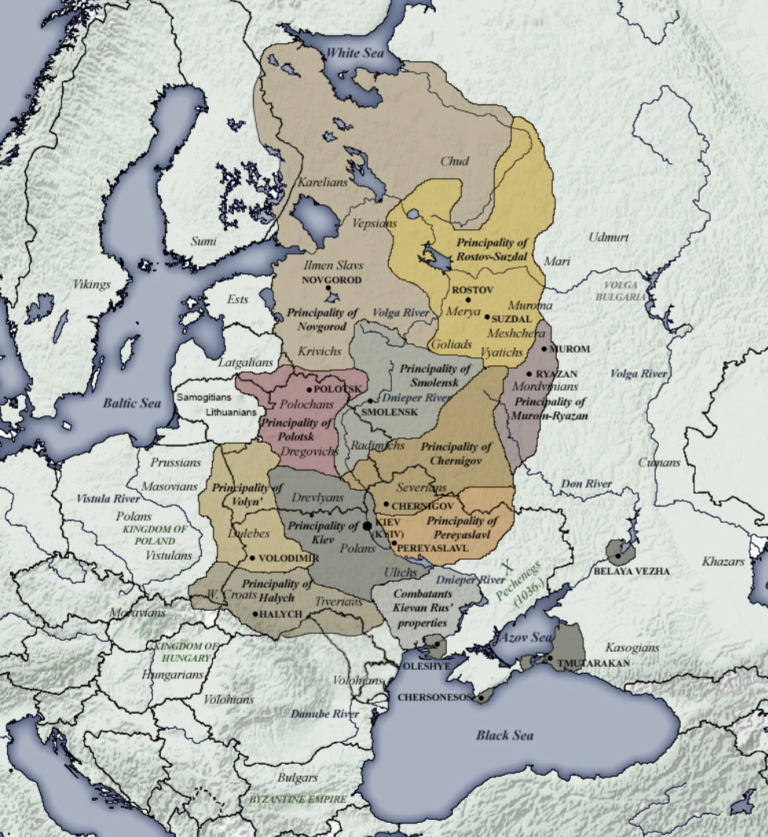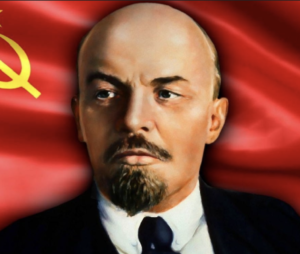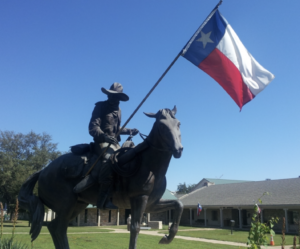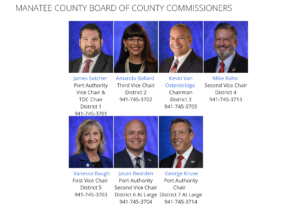Over the past few weeks, before Russian forces began pouring over the Ukrainian borders on February 24, Tucker Carlson on Fox News repeatedly insisted that the United States had no strategic interests in Ukraine, and “no moral or legal obligation” to defend Ukraine if the Russians did attack. I beg to differ. As the U.S. Embassy’s site officer for the event, I was there in the Kremlin in January of 1994 (I feel like the Forrest Gump of diplomacy) when President Bill Clinton stayed in the Grand Kremlin Palace for two nights during his state visit to Moscow. While there, he and Russian President Boris Yeltsin held a Trilateral Summit with Ukrainian President Leonid Kuchma to persuade him to surrender the nuclear missiles (SS-19s and SS-24s) that were still on Ukrainian territory, in exchange for security guarantees.
Bear with me through some Slavic history and arms control lore, but you see, this story pertains to both the ancient and the more recent history of the Russia-Ukraine relationship, including the disposition of the former Soviet Union’s nuclear weapons. The START I Treaty (Strategic Arms Reduction Treaty) was signed between the United States of America and the USSR on July 31, 1991 – in the waning moments of the Soviet Union, as republic after republic was peeling off and declaring independence. This treaty obligated the parties to it to reduce their nuclear warheads and their respective delivery systems (ICBMs, SLBMs, and strategic bombers) to a specified number in an intrusive inspection and verification regime (under President Reagan’s “trust but verify” maxim).
By Christmas Day of 1991, the Union of Soviet Socialist Republics ceased to exist. Thus, on May 23, 1992, the Foreign Ministers of the Russian Federation, the Republic of Belarus, the Republic of Kazakhstan, Ukraine, and the United States of America signed the Lisbon Protocol to the START Treaty, designating the four former-Soviet Republics listed above as the formal successor states to the START Treaty, alongside the U.S. The Lisbon Protocol also obligated Ukraine, Kazakhstan, and Belarus to accede to the 1970 Nuclear Non-Proliferation Treaty (NPT) as non-nuclear weapons states, meaning that they had to either return their nuclear weapons and delivery systems back to Russia, or verifiably destroy them on their own territory “in the shortest possible time” but no later than seven years as described in the START text itself. Kazakhstan quickly and gladly surrendered its nuclear stockpile back to Russia, while Ukraine struggled domestically as to whether it should give up its WMD trump cards that could instead serve to strengthen Ukraine’s national security. Meanwhile, after Alexander Lukashenko was elected President of Belarus in 1993, he dragged his heels as long as possible to surrender Russia’s remaining SS-25 road-mobile ICBMs back to Russia until the end of 1996.
(Nota bene: again, in my “Forrest Gump” role, I transferred from the U.S. Embassy in Moscow to the U.S. Embassy in Minsk in February 1995. As the Embassy’s political-military officer, it was my job to persuade my Russian diplomatic counterparts to press Lukashenko [aka: “Europe’s last dictator” as he is still known today] to agree to ship the last 16 missiles and associated nuclear warheads back to Russia. The Russian diplomats repeatedly shrugged off USG concerns, although they conceded that Lukashenko was inherently unstable. One Russian wag commented to me, “Lukashenko may be a bastard, but he’s our bastard.” I returned to Washington in August 1996 to continue working on weapons of mass destruction (WMD) treaties, and I was gratified to see that the Russians did get their nukes back from him in November. However, this story is more about Ukraine, so let’s go back to the Kremlin in January of 1994.)
Ukrainian President Leonid Kuchma was already obligated under the May 1992 Lisbon Protocol to either destroy or return to Russia the strategic nuclear arms on his territory. In the trilateral negotiations with Yeltsin and Clinton, who were teaming up to obtain his commitment to do so, I believe Kuchma played a weak hand very well. In exchange for upholding Ukraine’s START Treaty obligations, Kuchma extracted security guarantees from both Russia and the U.S., obligating them in turn “to respect the independence and sovereignty and the existing borders of Ukraine;” as was later codified on December 5, 1994, in the Budapest Memorandums on Security Assurances. Kuchma, Yeltsin, Clinton, and UK Prime Minister John Major, as another one of the five recognized nuclear weapons states under the NPT, signed this document. The other two recognized nuclear weapons states, China, and France, signed individual statements with Ukraine that contained these same assurances.
The Budapest Memorandums went on to state:
“2. The Russian Federation, the United Kingdom of Great Britain and Northern Ireland and the United States of America reaffirm their obligation to refrain from the threat or use of force against the territorial integrity or political independence of Ukraine, and that none of their weapons will ever be used against Ukraine except in self-defense or otherwise in accordance with the Charter of the United Nations;”
The fact is, Ukraine and Russia have been at war with each other non-stop for the past eight years, ever since the Ukrainian people forced Ukrainian President Yanukovich – a Russian puppet – to flee for his life to Moscow in February 2014, and the Russians then illegally annexed Crimea and invaded Ukraine’s eastern provinces of Donetsk and Luhansk over the next two months, under bogus pretexts. More than 13,000 people have died in the Donbas (Don River Basin) region since then, as Ukrainian, and Moscow-backed separatist forces have battled street-by-street against one another.
Over these past eight years, Moscow has also reconstituted four armies on Ukraine’s borders, rebuilt the Black Sea Fleet, created a powerful anti-access and area-denial bubble in the Black Sea, militarized Ukrainian energy installations there, and prepared the logistical infrastructure for a major war with Ukraine, including potential amphibious operations in the South. It has been building nuclear bunkers in Feodosia and Sevastopol. Even as of a few years ago, the Russian military clearly regarded large-scale, protracted conventional war, backed by mounting nuclear threats, to be a real possibility, at least with respect to keeping its territorial gains in Ukraine.
Curiously, amongst all the multilateral negotiating permutations that have been tried by the Europeans and the U.S. to bring peace between the affected parties over the past eight years since the Russian Federation violated its terms, the consultation mechanism prescribed in the Budapest Memorandums has never been enacted:
“6. Ukraine, the Russian Federation, the United Kingdom of Great Britain and Northern Ireland and the United States of America will consult in the event a situation arises that raises a question concerning these commitments.”
Perhaps that’s because the problem is, the Budapest Memorandums were only politically, and not legally, binding upon the signatories who gave these security guarantees. So, while Tucker Carlson may be correct in that the United States is not legally bound to defend Ukraine’s sovereignty and territorial integrity, I certainly believe that the United States is morally obligated to do so, at least to some extent. There are two political and moral reasons. First, Ukraine has President Clinton’s signature on the Budapest Memorandums as something of an offer of protection. Second, given that Ukraine has been an official NATO aspirant country since March of 2018, the United States and all other NATO member states should continue to rally around the brave people of Ukraine and do our utmost to support them with military and humanitarian aid, while punishing and isolating Russian President Putin and his coterie. I agree that NATO countries should endeavor not to take up arms directly against Russian forces, precisely so that we do not begin World War III. However, we should do everything short of that to aid Ukraine in defending itself.
Putin’s pretext for invading Ukraine because of its aspirations to join NATO was another Russian canard. Ukraine had little chance of meeting NATO membership requirements in the short or medium terms, and the Russian leadership knew that well. So, there was no imminent “danger” of Ukraine joining NATO. Further, third party countries do not get a veto over the security ties between other states, and I’m proud that all 30 NATO members have stood firm on that principle.
Let’s step back a bit and look at the history of Ukraine and Russia. In President Putin’s emotional, somewhat mad rantings about Ukraine over the past week in the lead-up to his invasion, Putin repeatedly asserted in his revisionist history that Ukraine is not a real country. I see two great ironies in that assertion. First, the original Russia, known as Kievan Rus’, emerged in the late 9th Century (circa 870s), and was centered on Kiev, or, as it is spelled in Ukrainian, Kyiv. At its height of power around 1050, its territory spread from the Black Sea in the south to the Baltic Sea and Karelia in the north, and a bit beyond what would soon become Moscow in the northeast and to the borders of what became the Kingdoms of Poland and Hungary in the west. Kievan Rus’ eventually disintegrated under the onslaught of Genghis Khan’s Mongol Horde, beginning in the 13th Century. After some 200 years, the Grand Dukes of Muscovy managed to finally defeat the Mongols’ Golden Horde while modern-day Ukraine and Belarus then fell under Lithuanian control. The point is, the Ukrainians could turn Putin’s argument on its head, and claim that Ukraine is the original, true Russia, rather than the Muscovite upstarts. It would be a fun historical argument.
The second irony of Putin’s claim that Ukraine is not a real country goes back to Stalin. When the United Nations was being established in 1945 as WWII was ending, Joseph Stalin cunningly insisted as the Soviet Union’s price for agreeing to the UN arrangements that, in addition to the USSR’s seat at the UN Charter Conference in San Francisco in June 1945, that the Ukrainian and Byelorussian Soviet Socialist Republics be given their own seats and perpetual individual votes at the UN. Thus, the Soviet Union got three votes in the UN General Assembly for the price of one. Putin is an unreformed Communist who drinks his own Kool-Aid. Or, as the Editor in Chief of the opposition newspaper in Moscow, “Novaya Gazeta,” put it in an interview with Fox News on February 25, 2022, “Putin and his National Security Council have over-gorged on their own propaganda.”
In my view, Putin had several reasons for wanting to take over Ukraine: 1) he would shore up his western flank against NATO while keeping Ukraine out of the Alliance; 2) he would establish a strategic land bridge through Ukraine to the Black Sea and to his Black Sea Fleet in Crimea and thus to greater control over the Black Sea; 3) he thought his invasion would lead to greater divisions within the NATO Alliance and perhaps bring about its destruction from within; 4) after capturing Ukraine, his forces could move west into Moldova and south into Georgia and re-conquer these largely pro-Western countries too, further solidifying his Western flank; and 5) if desired, he could take full control over his vassal state of Belarus, thus putting him well on his way to reconstituting the Soviet Union.
By the way, if Belarusian forces join in on Russia’s invasion of their neighbor, it would be a violation of Belarus’ constitution which forbids deploying troops outside the territory of Belarus. This was a legacy of the over-drafting of Belarusian conscripts to face the horrors of the Soviet Union’s war in Afghanistan. Of course, the Belarusian constitution has never been a barrier to President Lukashenko’s behavior, and in fact, his further violations of his constitution took place on Sunday, February 27, 2022, when he held a nationwide referendum that served to: 1) provide a mechanism for him to stay in power until 2035; 2) revoke Belarus’ status of neutrality so that his forces could join Russia’s in attacking Ukraine; and 3) rescind Belarus’ non-nuclear status so that Lukashenko could once again host Russia’s nuclear weapons – a clear violation of the NPT and several other arms control treaties. As with all electoral processes on Lukashenko’s watch, yesterday’s referendum was almost certainly a sham. As reported on ABC News’ website, the Belarusian government claimed that 65.2% of the population, out of the 78.6% who participated in the referendum, voted to approve all three initiatives. The opposition pointed out, however, that there was no one counting the votes.
Returning to Russia’s problems of the moment, happily so far, as of February 28, 2022, Putin’s dreams aren’t coming true. The courageous Ukrainians have dramatically slowed down his troops’ invasion, even as his logistics tail has shown classic Soviet ineptitude. Further, Putin’s invasion of Ukraine has served to unite, rather than fracture, the NATO Alliance, as the members have recalled that this kind of Russian behavior is why the Alliance was formed in the first place. Despite President Biden’s weakness, incompetence, and lack of leadership, our NATO Allies are stepping up to help Ukraine meet both its military and humanitarian needs, along with the formerly neutral countries of Switzerland and Sweden.
Next up: Part Two, Erstwhile Allies.





3 Responses
“So, while Tucker Carlson may be correct in that the United States is not legally bound to defend Ukraine’s sovereignty and territorial integrity, I certainly believe that the United States is morally obligated to do so, at least to some extent”. What does some extent mean? Morally obligated? That is the precept that has led to nearly a century of missteps on the US part and endless wars as we take on the moral obligation to be the world’s arbiter. You have so much good to say and learn in this article but you get decidedly waffly and imprecise here where it counts. Tucker was more right than you are able to convince me otherwise.
May I simply say what a relief to uncover somebody that really understands what theyre discussing over the internet. You certainly know how to bring a problem to light and make it important. More and more people really need to check this out and understand this side of the story. I was surprised that youre not more popular because you certainly have the gift.
I was pretty pleased to discover this great site. I need to to thank you for your time for this particularly fantastic read!! I definitely appreciated every part of it and I have you book marked to see new stuff on your blog.